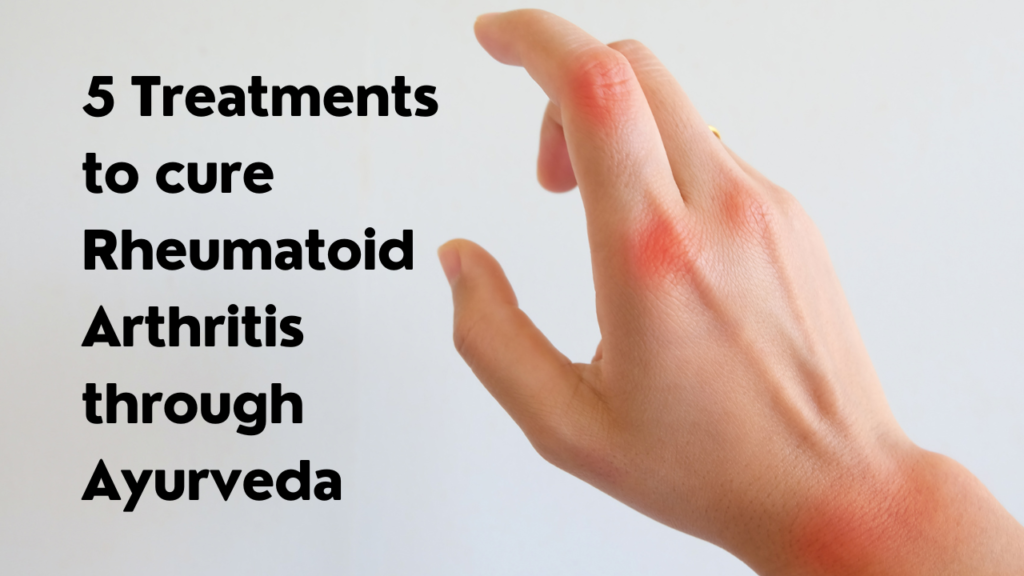Ayurveda, an ancient system of medicine from India, offers a holistic approach to health and aims to balance the mind, body, and spirit. While there is no known cure for rheumatoid arthritis (RA) in any medical system, including Ayurveda, Ayurvedic treatments can help manage the symptoms and improve the overall well-being of individuals with RA. It’s important to note that before starting any Ayurvedic treatment, it is advisable to consult with a qualified Ayurvedic doctor or healthcare professional.
What is Rheumatoid arthritis?
Rheumatoid arthritis (RA) is a chronic auto-immune disease where the body’s immune system mistakenly attacks its own tissues, primarily affecting the joints. This leads to inflammation, pain, and swelling in the affected joints. RA commonly involves smaller joints like those in the hands and feet, but larger joints can also be affected. The disease progresses with time, causing joint damage, deformities, and functional impairment. Additionally, RA can have systemic effects, impacting other organs and causing fatigue, fever, and weight loss. Early diagnosis and comprehensive management, including medication, physical therapy, and lifestyle adjustments, are crucial in controlling symptoms and minimising joint damage.
Here are some Ayurvedic treatments that may be recommended for managing rheumatoid arthritis:
Panchakarma
Panchakarma is a comprehensive detoxification and rejuvenation therapy practised at many of the best Ayurveda Wellness Centres. It encompasses a series of therapeutic treatments aimed at eliminating accumulated toxins (Ama) from the body and restoring harmony and balance. The process typically involves various procedures such as Abhyanga (full-body massage with herbal oils), Swedana (herbal steam therapy), and Basti (medicated enema). These treatments help loosen and eliminate toxins from deep within the tissues and channels of the body. Panchakarma also includes dietary modifications, herbal preparations, and lifestyle recommendations to support the cleansing process. By purifying the body and mind, Panchakarma promotes overall well-being and vitality.
Herbal remedies
Ayurveda employs a range of herbal remedies to assist in the management of rheumatoid arthritis (RA) symptoms. Several herbs are commonly used for their potential anti-inflammatory and analgesic properties. Turmeric (Curcuma longa), known for its active compound curcumin, has shown promise in reducing inflammation. Ginger (Zingiber officinale) has anti-inflammatory effects and may help alleviate pain. Boswellia (Boswellia serrata) has been traditionally used for joint health due to its anti-inflammatory properties. Ashwagandha (Withania somnifera) may help modulate the immune response and reduce inflammation. Guggul (Commiphora mukul) is believed to possess anti-inflammatory and analgesic properties. These herbs, when incorporated into an individualised Ayurvedic treatment plan, may provide relief from RA symptoms.
Diet and lifestyle modifications
Ayurveda places great emphasis on the role of diet and lifestyle in maintaining overall health, including managing rheumatoid arthritis (RA). An Ayurvedic practitioner may provide personalised dietary recommendations based on an individual’s dosha (constitutional type) and specific imbalances. These recommendations often involve incorporating anti-inflammatory foods into the diet. Fresh fruits, vegetables, and whole grains are encouraged for their nutritional content and antioxidant properties. Additionally, spices like turmeric, ginger, and garlic, known for their anti-inflammatory properties, may be recommended. Modifying lifestyle habits such as regular exercise, stress reduction techniques, and adequate rest can also support the body’s natural healing processes and enhance well-being for individuals with RA.
Yoga and Meditation
Yoga and meditation are integral components of Ayurvedic therapy for rheumatoid arthritis (RA). Regular practice of gentle yoga poses practised at some of the best Yoga Centres in Prayagraj, tailored to an individual’s needs can help improve joint flexibility, strengthen muscles, and enhance overall physical well-being. The mindful movements and controlled breathing involved in yoga can also promote relaxation, reduce stress levels, and improve mental well-being, which is particularly beneficial for individuals with RA. Meditation techniques, such as mindfulness and deep breathing, can further alleviate stress and enhance pain management. Combined, these practices may provide relief from pain, reduce inflammation, and contribute to a better quality of life for individuals living with RA.
Conclusion
In conclusion, while there is no known cure for rheumatoid arthritis (RA), Ayurvedic treatments offer a holistic approach to managing its symptoms and improving overall well-being. Ayurveda provides various therapies such as Panchakarma, herbal remedies,and dietary and lifestyle modifications. These treatments aim to reduce inflammation, alleviate pain, and promote joint health. Additionally, incorporating yoga and meditation practices can enhance flexibility, reduce stress, and contribute to overall relief. While Ayurvedic treatments cannot cure RA, they can complement conventional medical care and support individuals in their journey towards better management of the condition.
